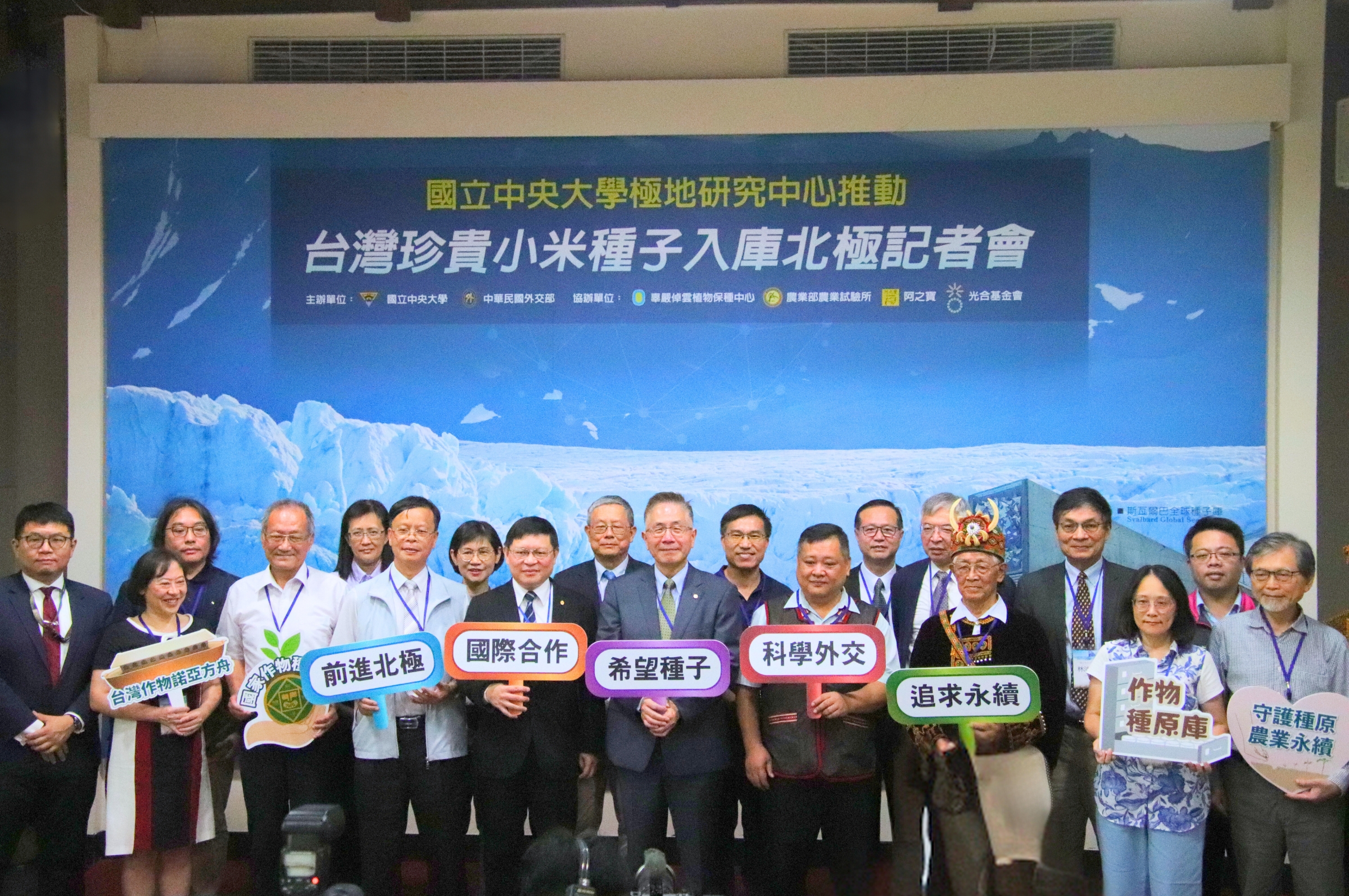Headlines

Driven by the Taiwan Polar Institute of National Central University, our research team will head to the Arctic at the end of May to deliver 170 precious Taiwanese millet seeds to the Svalbard Global Seed Vault in Norway to maintain the genetic diversity of millets. This is not only an achievement in science and diplomacy, but also an important milestone of international cooperation and sustainable development in Taiwan.
A ceremony marking Taiwan's participation in the Global Seed Vault will be held on May 29 in Svalbard, Norway. The ceremony will be attended by a delegation from Taiwan, including Prof. Chia-Wei Li, Executive Director of Dr. Cecilia Koo Botanic Conservation Center, Dr. Shu Chen, Director of Plant Genetic Resources Center of Taiwan Agriculture Research Institute, Prof. Jing-Yang Jou, President of National Central University, Dr. Shu-kun Hsu, Dean of College of Earth Sciences, Prof. Chuen-Fa Ni, Director of Taiwan Polar Institute, and Prof. Hwa Chien, Deputy Director of Taiwan Polar Institute, as well as representatives of Taiwan's indigenous peoples. The ceremony will feature a welcome reception and speeches highlighting the importance of protecting global agricultural heritage and the spirit of international cooperation, to underscore Taiwan's contributions to the conservation of global seed diversity.
Millet is an important staple food for indigenous peoples in Taiwan, and the only crop with a complete set of rituals. In response to the impact of climate change, millet plays a crucial role in food security, nutrition, and sustainable agriculture. The preservation and restoration of millet germplasm is essential for Taiwanese food culture and agricultural development under climate change. This project collects, collates, and processes seeds of Taiwanese millet varieties to ensure they have viable germination ability, and deposits them into the Svalbard Global Seed Vault for "off-site backup" and long-term preservation.
Led by Executive Director Chia-Wei Li, this mission integrated the efforts from Plant Genetic Resources Center of Taiwan Agriculture Research Institute and the A Zhi Bao team. Particularly, we would like to express our gratitude to Professor Warren H.J. Kuo, an honorary professor of the Department of Agronomy at National Taiwan University who introduced the millet seeds from the United States, to Mrs. Fang-hsien Shao, the wife of Professor Song-Bin Chang, the provider of the germplasm, to Bunun friends Zhon-ghe Quan and Ci-hao Quan, who were the first planters, and to the Hualien Branch of Forestry and Nature Conservation Agency, for making this beautiful achievement possible!
Dubbed the "Doomsday Seed Vault," the Svalbard Global Seed Vault serves as a Noah's Ark for global agriculture. Established in 2008 on the Norwegian archipelago of Svalbard in Spitsbergen Island, by 2024, it has collected 4.5 million seed samples of various plant species through donations from governments, research institutions, and non-governmental organizations worldwide. The successful operation of the Global Seed Vault demonstrates the international community's concerted efforts to safeguard global crop diversity.
The Global Seed Vault is located in the northernmost permanently inhabited town within the Arctic Circle, and is just two kilometers from National Central University's Arctic Research Station (TaiArctic Station). Utilizing underground tunnels as storage chambers, the natural low temperatures of the permafrost provide natural freezing conditions. Additionally, the seed vault is equipped with modern refrigeration equipment and can withstand a 6.2 magnitude earthquake as well as nuclear weapon attacks. This ensures that the seeds can be safely stored in low-temperature environments under all conditions and maintain their ability to germinate.
Millet is not only a source of food, but also a crucial symbol of Taiwanese culture and history. It plays a significant role in shaping Taiwanese identity. Taiwan's participation in the Global Seed Vault initiative aims to promote polar science and agricultural sustainability. In addition to this year's deposit, more millets will be deposited in batches in the coming years, over 400 varieties in total, ensuring a safe haven for their preservation in the face of natural disasters, pandemics, wars, or other global crises, paving the way for a sustainable and beautiful future for humanity.

